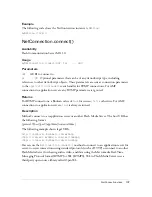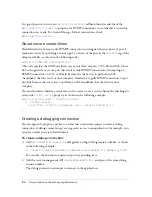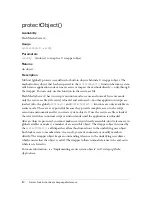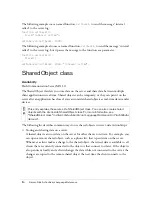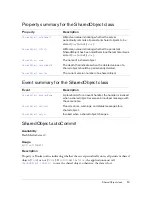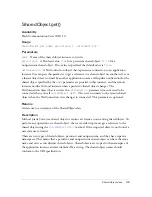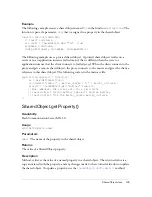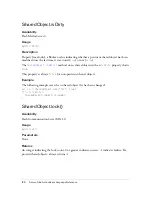
118
Server-Side ActionScript Language Reference
When you get a reference to a proxied shared object, any changes made to the object are sent
to the instance that owns the object. The success or failure of any changes are sent using the
SharedObject.onSync
event handler, if it is defined.
The
SharedObject.lock()
and
SharedObject.unlock()
methods cannot lock or unlock
proxied shared objects.
Method summary for the SharedObject class
NO
T
E
For more information on shared objects, see “About streams and shared objects”,
“Shared object flow”, and “Shared object files” in
Developing Media Applications
.
Method
Description
SharedObject.clear()
Deletes all the properties of a persistent shared object.
SharedObject.close()
Unsubscribes from a shared object.
SharedObject.commit()
Static; stores either a specific persistent shared object
instance or all persistent shared object instances that are
marked dirty.
SharedObject.flush()
Saves the current state of a persistent shared object.
SharedObject.get()
Static; creates a shared object or returns a reference to an
existing shared object.
SharedObject.getProperty()
Gets the value of a shared object property.
SharedObject.getPropertyNames()
Returns an array of all the current valid properties in the
shared object.
SharedObject.lock()
Locks the shared object instance. Prevents any changes
to this object by clients until the
SharedObject.unlock()
method is called.
SharedObject.mark()
Delivers all change events to a subscribing client as a
single message.
SharedObject.purge()
Causes the server to remove all deleted properties that
are older than the specified version.
SharedObject.send()
Sends a message to the client subscribing to this shared
object.
SharedObject.setProperty()
Sets a new value for a shared object property.
SharedObject.size()
Returns the number of valid properties in a shared object.
SharedObject.unlock()
Unlocks a shared object instance that was locked with
SharedObject.lock()
.




